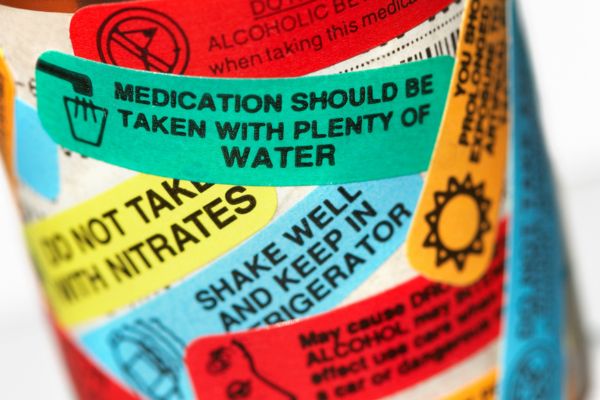Buprenorphine is one of the most effective medications for treating opioid use disorder (OUD). When combined with counseling and behavioral therapies, buprenorphine can help people with opioid addiction achieve and sustain long-term recovery.
However, the FDA recently released a warning about dental problems, especially tooth decay, in patients with buprenorphine treatments. This warning is specifically for buprenorphine oral tablets and films that are placed under the tongue or on the inside of the cheek.
If you or someone you know is taking buprenorphine, here’s what you need to know about the FDA warning about related dental problems.
What is Buprenorphine?
Buprenorphine is a partial opioid agonist derived from opioids that alters the brain and nervous system’s reaction to pain. It produces euphoria at low to moderate doses, weaker than full opioids like methadone and heroin.
When taken as prescribed, buprenorphine can help diminish the effects of opioid dependency, including withdrawal symptoms and cravings. It increases safety in case of overdose to potentially prevent death. And can lower the potential for opioid misuse.
Buprenorphine is FDA-approved for the treatment of opioid abuse in multiple products, including:
- Buprenorphine/Naloxone sublingual tablets
- Subutex (buprenorphine sublingual tablets)
- Suboxone (buprenorphine/naloxone sublingual films)
- Zubsolv (buprenorphine/naloxone sublingual tablets)
- Bunavail (buprenorphine/naloxone buccal film)
- Probuphine (buprenorphine implants)
- Sublocade (buprenorphine extended-release injection)
Buprenorphine and Tooth Decay
According to the 2022 FDA warning, medications that include buprenorphine, such as Suboxone, could cause tooth decay due to acid exposure to teeth and gums.
In their communication, the organization identified 305 cases of dental problems related to dissolved-in-the-mouth buprenorphine medicines. Remember, these were only directly reported and published in medical literature cases; there could be more that they’re unaware of.
The most common symptoms include:
- Tooth decay
- Cavities
- Bad breath
- Oral infections
- Tooth fracture
- Loss of teeth
Most of them were using buprenorphine for OUD, but 28 were using it for pain treatment. In at least 26 cases, patients had no prior history of dental problems. Some cases reported dental issues as soon as two weeks after treatment began.
It’s important to note that the buprenorphine medicines associated with dental problems are only tablets and films dissolved under the tongue or placed against the cheek.
Unfortunately, the FDA didn’t pinpoint any risk factors for dental problems in people who use buprenorphine medicines. And they also noted that the benefits of buprenorphine far outweigh the potential risks. The comprehensive approach of using buprenorphine combined with counseling is still one of the most effective ways to treat OUD and help people sustain addiction recovery.
Connection Between Buprenorphine Treatment and Dental Health
In one study of patients taking buprenorphine for over 45 months, researchers found many reported dental issues, including caries, fillings, cracked teeth, crown placements, root canal treatments, and tooth extractions. More than half of the participants reported toothache pain.
These dental issues mirror findings from previous reports; a significant percentage of the patients wanted dental treatment, indicating a perceived decline in oral health. Although the reasons for this decline are not clear, several factors like cigarette smoking, bruxism, regular soda consumption, moderate dental hygiene practices, and use of other psychotropic medications that can negatively impact oral health were reported by patients.
The way buprenorphine/naloxone treatment is used may also play a role in the patient’s dental issues. As the treatment is given sublingually and has an acidic pH, keeping the tablet and saliva in the oral cavity to enhance absorption can lead to a low pH environment. This and the medication frequency can alter the tooth surface microbial profile and promote dental caries.
However, the study acknowledges limitations such as a small sample size, potential confounding factors that might contribute to the development of caries, and the lack of a control group which makes it impossible to ascertain if dental issues predated the use of buprenorphine or were related to other lifestyle or biological factors.
How to Treat Buprenorphine-Induced Tooth Decay?
It’s important to remember that experiencing dental health issues is a common effect of drug abuse. Poor hygiene, poor nutrition, tobacco use, and opioid abuse can all contribute to tooth decay.
Also, dental problems tend to be side effects of mouth-dissolving medications. However, you can maintain your buprenorphine treatment while protecting your oral health.
If you want to avoid your teeth rotting because of the use of buprenorphine, the FDA recommends some extra steps in your treatment:
- Gently rinse your teeth and gums with water after the sublingual tablet or the film is completely dissolved. Swish the water around your mouth to remove any remaining medication, then swallow.
- Brush your teeth after an hour of taking the tablet or film.
- Schedule a dental checkup, inform the dentist about your buprenorphine treatment, and have regular follow-up appointments.
However, if you are already experiencing dental problems due to buprenorphine oral administration, you will need dental treatment. Some reported cases required:
- Tooth extraction/removal
- Root canals
- Dental surgery
- Crowns or implants
Should I Be Worried If I’m Taking Buprenorphine?
An estimated 1.7 million people take prescripted buprenorphine, whether for OUD or pain treatment and many report no dental pain or other oral health issues. Incorporating some extra steps in your daily dental care routine can help reduce the chances of dental problems caused by buprenorphine.
If you are a patient currently on buprenorphine treatment, remember not to stop taking the prescribed medication abruptly. Doing so could lead to relapse, misuse or abuse of other opioids, overdose, and death.
The best thing you can do is contact your healthcare facilitator and explain your concern. They could lower your daily dose or suggest another administration route. They can also help you contact a dental care professional to prepare a tooth decay prevention plan.
